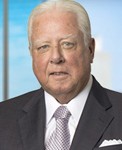Darrell Jordan, one of the all-time great Texas lawyers and counsel to scores of business leaders, died Wednesday. He was 80.

A former basketball player at the University of Texas and graduate of the SMU Dedman School of Law, Jordan represented companies and their executives in complex commercial litigation for five decades.
Jordan argued a landmark case before the U.S. Supreme Court, served as president of the State Bar of Texas, was a candidate for mayor, led the drive to dome the Cotton Bowl and was a father of two lawyers. He was a political conservative who advocated zealously for legal aid for the poor and equal access to justice.
“Darrell was a legal giant,” says Mike Gruber, a partner at the Dorsey law firm and long-time friend and colleague of Jordan. “Darrell made the world better in what he accomplished and also in the way he accomplished it.”
A leader in the Salesmanship Club and the Dallas Bar Association, Jordan was a regular for lunch at the 19th Hole at the Dallas Country Club and spotted regularly enjoying wine and pizza at Louie’s on Henderson Ave.
“If you needed advice, you went to ‘Uncle Darrell.’ He meant the world to me and a lot of people,” says Mark Sales, a partner at Diamond McCarthy where he practiced with Jordan. “Darrell is a big loss to this community. He will be greatly missed.”
In 2016, The Texas Lawbook named Jordan as one of its “Lions of the Texas Bar.” In fact, he received nearly every award that could be given to lawyers, including Texas Appleseed’s Good Apple Award, SMU Dedman School of Law’s Distinguished Alumni Award, Dallas Bar Association’s Justinian Award and Texas Equal Access to Justice Commission’s Stars of Justice Award.
In an interview three years ago with The Lawbook, Jordan said he got his street smarts as a lawyer from the so-called Henry Wade University – the moniker assistant prosecutors once gave the workplace of the long-serving, late Dallas district attorney.
“It’s important work,” Jordan said of the D.A.’s office, where he not only launched his legal career but also discovered the gratification of public service.
He used his position as head of litigation at Hughes & Luce in the 1980s to support candidates for judicial seats. While Jordan considered himself an old fashion Barry Goldwater Republican, he openly campaigned for some Democrats. For example, he led election efforts for Dallas lawyer Ron White to be one of the first African-American judges elected countywide.
“He never hesitated to take a stand on matters that addressed the diversity issues that he was a strong proponent of,” White, a partner at White, Wiggins & Barnes, told The Texas Lawbook Thursday afternoon. “I think those who really got a chance to know him will miss his input and know he had conservative alliances, but at the same time, he had a pragmatic or liberal approach to the future development of Dallas.”
Jordan ran for Dallas mayor but lost narrowly to Ron Kirk, who was the first African-American mayor in the city. Kirk and Jordan became friends and have supported each other’s civic efforts.
”Darrell is not only a damn good lawyer, he’s a friend and I appreciated his counsel while I was mayor,” Kirk told The Texas Lawbook in 2016. “Darrell has done far more than his fair share for the community and for the legal profession.”
Jordan’s commitment to public service was on full display when he led the defense of the state’s use of legal trust fund interest to help pay for legal services for the poor.
In March 2003, the U.S. Supreme Court ended a nine-year legal battle by ruling in favor of the Interest on Lawyer’s Trust Accounts (IOLTA) Program. Lawyers familiar with the case say Jordan donated thousands of billable hours and tens of thousands of dollars out of his own pocket toward the IOLTA effort, which has benefited tens of thousands of low-income Texans who needed legal representation.
As part of his efforts, he achieved a legal objective that few lawyers – even most great trial lawyers – accomplish: he briefed and presented oral arguments to the Supreme Court.
“There’s no question,” Jordan said. “IOLTA began the process of having influential people – legislators, judges, others – understand the importance of funding legal services for the poor.”
Under the IOLTA program, the interest collected from the various trust accounts from lawyers across the state that temporarily hold payments by clients is combined by the banks and given a special, higher interest rate. That money is then paid to the Texas Access to Justice Foundation, which funds various legal aid projects across the state.
In a 2016 interview, Jordan said one of his most memorable cases grabbed media headlines as a “cold war.”
Jordan and colleagues at Hughes & Luce, where he spent 24 years, represented Haagen-Dazs when Baskin-Robbins sued the Pillsbury Co. subsidiary for trademark infringement.
In fact, Baskin-Robbins had trademarked the name Pralines ‘N Cream when Haagen-Dazs introduced Pralines & Cream.
“You have to police your trademark,” Jordan explained. He sent paralegals around the country to buy Pralines ‘N Cream from many other ice cream stores.
Haagen-Dazs prevailed, although Jordan noted, “We all gained 10 pounds.”
Jordan’s client list was envied by many in the legal profession. He represented Citibank in multiple litigation matters, including a class action regarding the business’s lending practices. The city of Arlington hired him to lead an investigation into allegations of corruption within its police department and municipal court system. He successfully defended a Dallas TV reporter who was sued by a pair of Dallas Cowboys football players.
A huge proponent of the American jury system, Jordan said he feared that the right to trial by jury is slowly eroding.
“The ability to have our civil disputes decided by our peers is a fundamental right in our Constitution,” he said. “It is a cherished right that should be vigorously preserved.”
